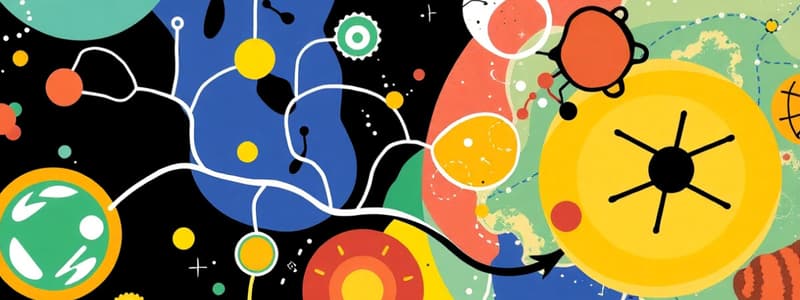Podcast
Questions and Answers
What does the scientific method include as a crucial step after forming a hypothesis?
What does the scientific method include as a crucial step after forming a hypothesis?
- Conclusion
- Experimentation (correct)
- Observation
- Replication
Which branch of science focuses on abstract concepts like numbers and reasoning?
Which branch of science focuses on abstract concepts like numbers and reasoning?
- Natural Sciences
- Social Sciences
- Applied Sciences
- Formal Sciences (correct)
What is the primary purpose of peer review in science?
What is the primary purpose of peer review in science?
- To create new scientific theories
- To fund scientific research projects
- To improve public understanding of science
- To ensure validity and credibility of scientific work (correct)
Which of the following is NOT a component of natural sciences?
Which of the following is NOT a component of natural sciences?
What is a key benefit of science in society?
What is a key benefit of science in society?
Flashcards are hidden until you start studying
Study Notes
Definition of Science
- Systematic enterprise that builds and organizes knowledge.
- Involves observation, experimentation, and theory formulation.
Branches of Science
-
Natural Sciences: Study of natural phenomena.
- Physics: Study of matter and energy.
- Chemistry: Study of substances and their reactions.
- Biology: Study of living organisms.
-
Formal Sciences: Study of abstract concepts.
- Mathematics: Study of numbers, quantities, and shapes.
- Logic: Study of reasoning and arguments.
-
Social Sciences: Study of human behavior and societies.
- Psychology: Study of mind and behavior.
- Sociology: Study of social behavior and structures.
- Economics: Study of production, distribution, and consumption of goods.
Scientific Method
- Observation: Gathering information through senses.
- Hypothesis: Formulating a testable prediction.
- Experimentation: Conducting experiments to test the hypothesis.
- Analysis: Interpreting data collected from experiments.
- Conclusion: Drawing conclusions based on data analysis.
- Replication: Repeating experiments for verification.
Importance of Science
- Advances technology and innovation.
- Enhances understanding of the universe and human health.
- Informs policy-making and environmental conservation.
- Encourages critical thinking and problem-solving skills.
Key Concepts
- Theory: A well-substantiated explanation of an aspect of the natural world.
- Law: A statement based on repeated experimental observations that describes an aspect of the world.
- Variable: Any factor that can be controlled or changed in an experiment.
- Peer Review: Evaluation of scientific work by other experts in the field to ensure validity and credibility.
Current Trends
- Interdisciplinary studies (combining multiple fields).
- Emphasis on sustainable practices and environmental science.
- Advances in technology driving research (AI, genomics, etc.).
- Open-access platforms for scientific communication.
Definition of Science
- Science is a systematic way of organizing knowledge about the natural world
- It involves observation, experimentation, and creating theories
Branches of Science
- Natural Sciences study the physical world
- Physics focuses on matter and energy
- Chemistry explores substances and their reactions
- Biology looks at living organisms
- Formal sciences focus on abstract concepts
- Mathematics analyzes numbers, quantities, and shapes
- Logic studies reasoning and arguments
- Social sciences examine human behavior and societies
- Psychology studies the mind and behavior
- Sociology looks at social conduct and structures
- Economics explores the production, distribution, and consumption of goods
Scientific Method
- The scientific method is a process used to investigate phenomena
- Begins with observation, gathering information through senses
- Uses observation to create a hypothesis, a testable prediction
- Experiments are designed to test the hypothesis
- Data from experiments is analyzed to draw conclusions
- Experiments must be replicated (repeated) for verification
Importance of Science
- Science drives advancements in technology and innovation
- It helps us understand the universe and human health
- Science informs policies and environmental conservation efforts
- Science encourages critical thinking and problem-solving skills
Key Concepts
- A theory is a well-supported explanation of a natural phenomenon
- A scientific law is a statement describing an aspect of the world, based on repeated observations
- A variable is any factor that can be controlled or changed in an experiment
- Peer review is the evaluation of scientific work by other experts in the field to ensure validity and credibility.
Current Trends
- Science is becoming more interdisciplinary, connecting different fields
- There is an emphasis on sustainable practices and environmental science
- Advances in technology, such as AI and genomics, are driving scientific research
- Open-access platforms are being used for scientific communication
Studying That Suits You
Use AI to generate personalized quizzes and flashcards to suit your learning preferences.




